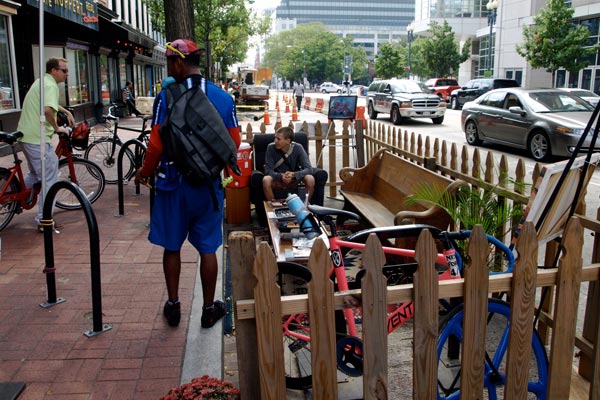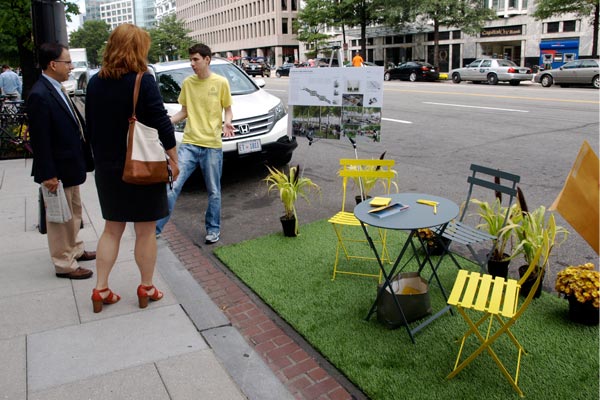Optional Workshops, Networking Activities, & Special Events
Several optional sessions, networking activities, and other special features are part of, or are being held in conjunction with the 14th Annual New Partners for Smart Growth Conference. Additional fees may apply and pre-registration is required for some of these events, while others are free to any conference attendees interested in participating.
Networking Activities
Thursday Networking Session for Health Professionals
Networking Lunch for Health Professionals — 12:00 – 1:30 PM
Key Ballroom 1 & 2
Join your peers to discuss your experience integrating smart growth strategies into your work as a health professional or how you’d like to get started. Exchange information with other health professionals about their experiences in smart growth practices, what worked, what didn’t, and insights gained. Help identify core competencies for health agencies working on smart growth and how to develop staff to work on these issues. Participants will walk away with new ideas and a network of health professionals to call on for technical assistance. Light refreshments will be provided. Space will be limited, so get there early!
Friday Morning Networking Sessions — 7:00 – 8:30 AM
Making It Happen: Building Diverse Partnerships for Equitable Solutions
Key Ballroom 4
Grab your breakfast and take advantage of this engaging opportunity to network with other conference participants working on social equity and environmental justice issues across the country. To start things off, representatives from St. Louis, Baltimore and Sacramento will briefly describe some of the work that they are undertaking. Find out about challenges they’ve faced to create more sustainable and equitable communities, successes they have experienced through diverse partnerships, and future goals to take advantage of new opportunities moving forward. There will be plenty of time for a robust discussion, so don’t miss out!
Smart Growth in Rural Communities and Small Towns: A Marketplace of Ideas
Key Ballroom 3
Rural communities and small towns across the country are implementing approaches that help their communities strengthen their economies, protect the environment, and enhance quality of life. Do you already work on smart growth issues in a rural region or small town, and want to know what others are doing? Are you interested in learning more about implementing smart growth in your town? Are you an urban dweller interested in rural towns near your city and the role rural places play in your urban economy? If you answered ‘yes’ to any of these questions, then this networking session is for you! The session will be a “marketplace of ideas,” with small group discussions on economic diversification, demographic change, rural-urban connections, and will build on the themes discussed in many of the rural/small town sessions taking place during the conference. Please join us to contribute and learn from these rich conversations, and to connect with others working in small town and rural contexts.
Understanding the Challenge – A Poverty Simulation Experience
Thursday, January 29, 2:00 – 5:30 PM
Saturday, January 31, 10:15 AM – 1:45 PM (includes lunch)
More than 45 million Americans live in poverty, according to a 2013 report on “Income and Poverty in the United States” [http://www.census.gov/content/dam/Census/library/publications/2014/demo/p60-249.pdf] by the U.S. Census Bureau. One in five children in our country – more than 14 million of our youngest and most vulnerable – experience the hunger, deprivation, mental stress, violence and sense of hopelessness that is so often part of their life every day. And nearly 10% of our senior citizens, aged 65 and older, also fall below the poverty threshold.
Poverty is also greater among our communities of color: Nearly one-quarter of Hispanics, 12.7 million, and more than 27% of African Americans, 11 million, lived in impoverished households in 2013.
As big as those numbers are, the government definitions of “poverty” – annual incomes of less than $12,000 for one person and $23,834 for a family of four – don’t fully capture all of the households who experience the reality of being economically disadvantaged in America.
Join trained facilitators, other attendees and several volunteers in a 3.5-hour Poverty Simulation Experience that replicates the daily challenges those living in poverty experience. Step into the shoes of low-income families, and try to provide food, shelter and other basic necessities while interacting with “community resources.” See and feel poverty from a new perspective in this eye-opening experiential setting, and take home with you a deeper understanding that can make you more effective in your work.
This unique experience will run twice during the New Partners conference, and is made possible through support from The Annie E. Casey Foundation, Kaiser Permanente, and the University of Maryland School of Nursing Shady Grove Campus.
![]()
![]()
![]()
Space is limited in each session, so get there early to reserve your space!
Annie E. Casey will provide welcoming remarks, and representatives from Kaiser Permanente of the Mid-Atlantic States Educational Theatre will facilitate.
Educational Theatre is one component of Kaiser Permanente’s Community Benefit Department. Kaiser Permanente created Educational Theatre in 1984 to inspire children, teens and adults to make informed decisions about their health and to build stronger, healthier communities.
Educational Theatre uses professional performers, artists and educators and performs free of charge to schools, non-profit organizations, and community groups in the Greater Washington D.C. Metropolitan Area, including Baltimore City, suburban Maryland, and Northern Virginia.
Over the two and half plus decades since its founding, having served more than 1,180,000 children, teens and adults throughout Maryland, Virginia and the District of Columbia, Educational Theatre has become Kaiser Permanente’s signature contribution to community health education. By involving the audience in the performances, Educational Theatre mobilizes them to serve as health advocates in their communities, arming them with valuable information to better their lives and the lives of those around them – family, friends, neighbors, other children and adults.
What I Learned From A Poverty Simulation
by Anthony Flint
Technology Fair
An Interactive Open House of Tools for Community Design, Public Engagement and Decision Making
Friday, January 30 — 9:30 AM – 3:30 PM
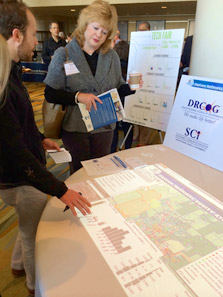
![]() The Technology Fair will be an open house where you will meet more than a dozen smart-planning tool and service providers. Join us in the Key Ballroom Foyer to experiment with the tools hands-on, and see how they can be applied to challenges you face with projects you’re working on. This open house is the place to find cutting-edge tools for scenario-planning, opportunity mapping, crowdsourced planning and community engagement.
The Technology Fair will be an open house where you will meet more than a dozen smart-planning tool and service providers. Join us in the Key Ballroom Foyer to experiment with the tools hands-on, and see how they can be applied to challenges you face with projects you’re working on. This open house is the place to find cutting-edge tools for scenario-planning, opportunity mapping, crowdsourced planning and community engagement.
We are expanding on last year’s Tech Fair, where 13 different tool providers were able to share their innovative products. The current line-up of tools is as follows:
- Calthorpe Analytics: UrbanFootPrint
- Conveyal: Transport Analyst
- GreaterPlaces: greaterplaces.com
- ICLEI-USA: ClearPath
- Just Economics LLC: Value Capture Fee
- MetroQuest: MetroQuest
- National Center for Smart Growth, UMD: OPPMAP
- NatureServe: NatureServe Vista
- OppSites: OppSites
- PlaceMatters: WALKscope, CrowdGauge, Brainstorm Anywhere
- Placeways: CommunityViz
- Texas Coastal Watershed Program: Gulf Coast CHARM
- The Trust for Public Land: GIS Decision Support Tools for Resilient Cities
- U.S. EPA: Community Typology Dashboard, The Decision Landscape Suite of Decision Support Tools, EnviroAtlas, EPA Climate Tools, National Stormwater Calculator
The Tech Fair is brought to you by PlaceMatters, and made possible by the EPA, the Open Planning Tools Group and OppSites.
* The Open Planning Tools Group (OPTG) is a consortium of tool developers, academic researchers, and leading public agencies working to document and expand best practice applications of planning tools across a range of domains, including climate adaptation, land use, transportation, and fiscal impacts modeling. PlaceMatters has played a convening role with this group, whose membership includes the National Center for Smart Growth, SACOG, Calthorpe Associates, Fregonese Associates, and the Lincoln Institute of Land Policy.
The Rise of The Walking and Biking Culture
Friday, January 30, 2015, 12:15 – 1:15 PM
Grab a lunch and join us for a discussion with Kevin Klinkenberg, Author of “Why I Walk: Taking a Step in the Right Direction”.
FREE Transit Passes from MDOT and MTA
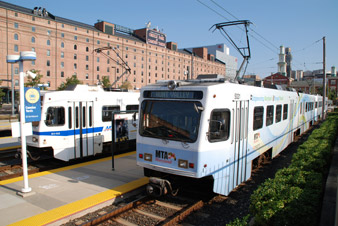 The Maryland Department of Transportation (MDOT) and its Modal Agency Maryland Transit Administration (MTA) are generously providing complimentary weekly transit passes for all New Partners for Smart Growth Conference attendees.
The Maryland Department of Transportation (MDOT) and its Modal Agency Maryland Transit Administration (MTA) are generously providing complimentary weekly transit passes for all New Partners for Smart Growth Conference attendees.
The passes are valid for use on MTA Light Rail, Baltimore Metro Subway and MTA local buses. Participants will be able to pick up their free passes when they check in during onsite conference registration hours at the Baltimore Hilton Inner Harbor Hotel. More details will be included in participant confirmation material sent out in early January 2015.
![]()

Parklets 3.0: The Parklet Experience
 Coordinated by the American Society of Landscape Architects (ASLA), New Partners is again bringing the parklet movement indoors to highlight the need for more urban open space. These participatory installations will showcase how a parking spot-sized space can transform into exciting opportunities for creating more vibrant places in your community.
Coordinated by the American Society of Landscape Architects (ASLA), New Partners is again bringing the parklet movement indoors to highlight the need for more urban open space. These participatory installations will showcase how a parking spot-sized space can transform into exciting opportunities for creating more vibrant places in your community.
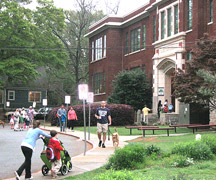 Parklets are small urban parks, often created by replacing parking spots with sod, planters, trees, benches, café tables with chairs – maybe even artwork or bicycle parking. They are designed to provide public place and bring awareness to the amount of public space that is devoted to the automobile rather than to creating vibrant community spaces.
Parklets are small urban parks, often created by replacing parking spots with sod, planters, trees, benches, café tables with chairs – maybe even artwork or bicycle parking. They are designed to provide public place and bring awareness to the amount of public space that is devoted to the automobile rather than to creating vibrant community spaces.
Y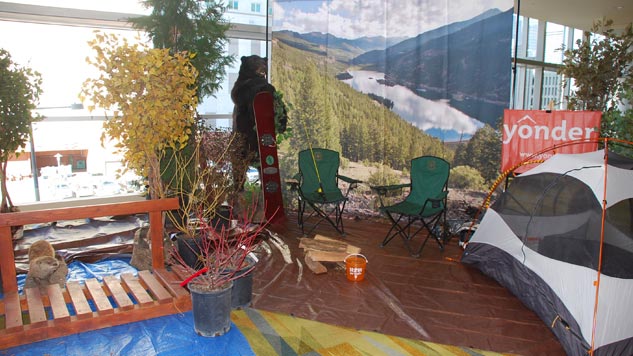 ou will find several parklet installations at the conference to illustrate just what you can do in an 8’ x 20’ space. Learn what organizations are doing to enliven their communities and be inspired by simple ideas to increase the communal and vegetated spaces in our city’s streetscapes.
ou will find several parklet installations at the conference to illustrate just what you can do in an 8’ x 20’ space. Learn what organizations are doing to enliven their communities and be inspired by simple ideas to increase the communal and vegetated spaces in our city’s streetscapes.
An Age-Friendly Public Space ReImagining the Canopy Have a Nice Bay ReImagining Streets The Teacher Is In: School Siting Tools You Can Use It’s exciting to see a growing number of communities rethinking how to use public space. One of the great benefits of parklets is how easily they can be installed or modified with little capital expense to meet community needs. – Deborah Steinberg, Professional Practice Manager for the American Society of Landscape Architects (Year 3 of Getting Your Community in Shape) The EPA, along with a team of national smart growth experts, has created the elixir to your planning and development health ills. It comes in a Building Blocks Toolbox of smart growth-related concepts and strategies that can assist your community in creating better public spaces, more vibrant, mixed-use districts and a healthier attitude toward what it means to be a sustainable community. The toolbox contains over a dozen resources that can assist communities of all sizes and shapes. During the conference, the EPA’s Office of Sustainable Communities will be holding 20-minute “office hours” to match your ailment with a prescription from the toolbox. You will talk with a member of EPA or a national expert on a specific topic. Appointments are highly encouraged, although walk-ins can be accommodated. Check out the list of tools at epa.gov/smartgrowth/buildingblocks.htm#tools to determine your topic of conversation, then make an appointment. Appointments can be scheduled by contacting Kevin Nelson at nelson.kevin@epa.gov or 202-566-2835.The Doctor Is In
Prescriptions to Create Sustainable Communities through EPA’s Building Blocks Program
 Do your streets need a diet? Are you experiencing unwanted growth? Or maybe a population hemorrhage? Do you need an infill transplant? Have any other built environment ailment?
Do your streets need a diet? Are you experiencing unwanted growth? Or maybe a population hemorrhage? Do you need an infill transplant? Have any other built environment ailment?


